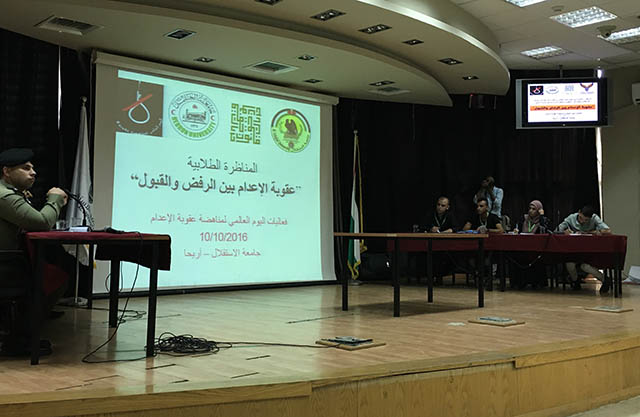News Archive
College of Law Won a Debate on the Abolition of Death Penalty
A team of students from Hebron University College of Law and Political Science won a national debate against the team of the College of Law and Police Sciences of Al-Istiqlal University (Jericho). The Hebron team incorporated four students: Ms. Bara Masalmeh, Mr. Mutaz Shawar, Mr. Mughera Awawda, and Mr. Mazen Zaro. The team was accompanied by Dr. Mutaz Qafisheh, Dean of the College, Dr. Bilal Shobaki, Head of Political Science Department, Mr. Nour Awad and Ms. Diana Khleif, lecturers at the College. The debate was attended by 80 students from Hebron University and a similar number from Al-Istiqlal University.
Hebron University’s team represented the side that opposes death penalty while Al-Istiqlal team supported capital punishment. The jury from the Independent Commission for Human Rights declared the victory Hebron team due to the strong arguments that it advanced and the convincing presentation skills, including the fact that death penalty failed to reduce crime rate in the countries that applies it, the inability to avoid the consequences of such punishment, the global trend towards the abolition of death penalty, and the fact that this penalty remained mainly in dictatorial countries that use death largely to punish political opponents.
After the debate, a number of university professors gave comments on the legal, psychological and political aspects relating to death penalty. Dr. Mutaz Qafisheh, in his intervention on death penalty in international law and Islamic jurisprudence, noted that Islam is the religion of life, not death, and that Islamic jurisprudence has innovated ways to reduce or abolish death penalty, including the Diya (compensation), amnesty, Aqila (extended family), and Diwan (social solidarity to support victim’s family). Jurists used doubts in favor of the accused in order to evade death penalty. Qafisheh also called upon the State of Palestine to formally abolish death penalty by joining the Second Optional Protocol to the International Covenant on Civil and Political Rights and, more importantly, to cease all forms of extra-judicial killings.







